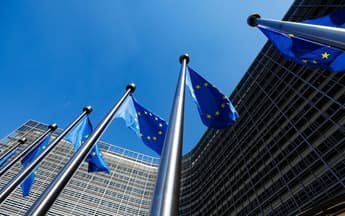European clean hydrogen projects and electrolyser manufacturing are being supported as part of a €4.8bn ($5.1bn) Innovation Fund push.
With 85 Net Zero projects selected in total, the package is supporting six clean hydrogen production projects and eight electrolyser manufacturing firms.
The Innovation Fund using revenues raised from the EU’s emissions trading scheme (ETS), paid by big emitters to award grants for clean energy projects.
European Commission Climate Chief, Wopke Hoeskstra, said this latest funding spree demonstrated how the EU ETS is a “great tool in reducing emissions and funding the projects we need to build a climate-neutral and competitive Europe.”
Four green hydrogen projects in Belgium, Germany, France and Finland; one Belgian blue hydrogen plant; and a waste-to-hydrogen facility in Sweden are all being supported. These are:
- The European Network for Hydrogen and Ammonia Carbon-Neutral Energy (Belgium), which has few details available Developed by Air Liquide, the project will produce green hydrogen for ammonia production and liquefaction.
- H2BE (Belgium). Under development by Engie’s Electrabel subsidiary and Equinor, the project is expected to produce 210,000 tonnes of blue hydrogen through autothermal reforming (ATR) by 2030.
- H2HubEmden (Germany) by Statkraft will build a 200MW electrolyser built at the Emden power plant.
- Hydrogen Offshore Dunkerque (France), is an offshore electrolyser plant by EDF, which will use offshore wind to produce green hydrogen.
- Solavy Chemicals, under its HydroGreen (Finland) project, will install a 30MW electrolyser at its Kouvola factory for the production of hydrogen peroxide.
- Köping Hydrogen Park (Sweden) will see a plasma gasification system produce 12,000 tonnes of hydrogen per year from over 60,000 tonnes of waste.
The green hydrogen projects are expected to produce a combined 61,000 tonnes of green hydrogen per year.
Electrolysers win big
Additionally, eight electrolyser manufacturers have grabbed funds. These include Norwegian-based Nel, which has already announced the €135m in funding that will be used to scale manufacturing of its new pressurised alkaline technologies.
Read more:Nel gives pressurised alkaline electrolysers a second shot with €135m EU boost
Compatriot HydrogenPro’s Danish subsidiary secured €16.5m to support the production of 350MW of its next-generation electrodes in Denmark. The H2-GIGA plant is expected to come online by Q1 2025.
Norwegian PEM company Hystar will receive €26m to fund the installation and operation of its automated giga-scale production line for its electrolyser stacks in Høvik, Norway. The line is expected to boast 1.5GW of capacity by 2027 and 4.5GW in 2031.
Having announced plans to commercialise the technology in March, thyssenkrupp nucera will use funding to make 300MW of solid oxide electrolyser (SOEC).
Read more: thyssenkrupp nucera looks to commercialise SOEC tech with Fraunhofer IKTS
Estonia’s Elcogen will use the funding to support the manufacturing of its SOEC technology in Tallinn,
Netherlands-based Battolyser Systems will use its grant to build its 1GW factory in the Port of Rotterdam which will produce its alkaline electrolysers with battery functionality which improves flexibility with fluctuating renewables.
Read more: Battolyser Systems CEO: Our alkaline tech can outperform PEM in hydrogen flexibility
Advent Technologies’ Greek business was awarded funding to produce PEM electrolysers and high-temperature PEM (HT-PEM) fuel cell components.
Italy’s VisionH2 was the only anion exchange membrane (AEM) electrolyser firm to gain access to Innovation Fund grants. It will use the money on a “modular and highly replicable” factory to build a distributed European manufacturing network.








